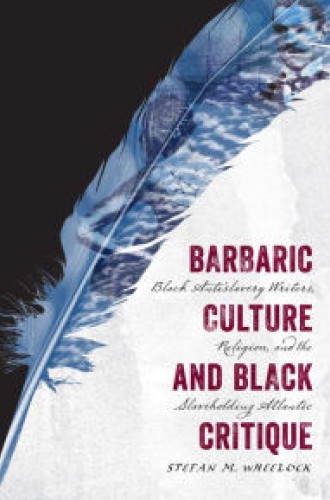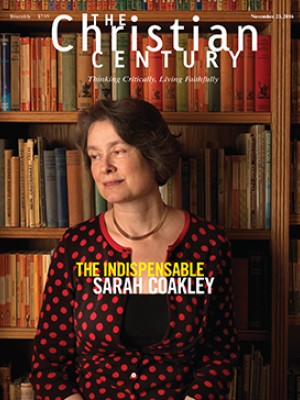Black critiques matter
Criticism of the slave trade from 200 years ago speaks to us today—and not just about race.
Because of Hollywood, Rudyard Kipling is best remembered for his collection of short stories The Jungle Book. When we think of Kipling, if we consider him at all, we usually draw to mind cute or harrowing adventures of children and animals.
For Anglo-American history, however, Kipling is better recalled as the author of “The White Man’s Burden,” a poignant poem from the late 1890s. Addressed to white Americans at the birth of their overseas empire during the Spanish-American War of 1898, this poem offers perspective from British experiences. “Take up the White Man’s burden,” the poem begins, “Send forth the best ye breed— / Go, bind your sons to exile / To serve your captives’ need.” The poem then describes colonized peoples as “half devil and half child.” For Americans like Theodore Roosevelt, the poem inspired imperialism, which it appeared to wrap in sacrificial effort.
Read our latest issue or browse back issues.
What Roosevelt and many others missed was Kipling’s warning. Empire meant responsibility and work, but it also meant judgment. “By all ye will or whisper,” Kipling counseled, “By all ye leave or do, / The silent sullen peoples / Shall weigh your God and you.”
Kipling was right, in part. Those who have been exploited by Anglo-American empires throughout the centuries have weighed their gods and their people. They have judged white societies and their faiths by what they have done and what they have failed to do. For some, like Malcolm X, the actions of many white people proved not only their religious hypocrisy but also the falsity of their faith traditions. For others, white supremacy revealed a corrupted Christianity. Where Kipling was wrong, however, was in thinking the oppressed people were silent.
As literary historian Stefan M. Wheelock demonstrates, black writers from the late 18th and early 19th centuries judged modern Euro-American cultures. The perspectives of writers like Ottobah Cugoano, Olaudah Equiano, David Walker, and Maria Stewart did more than shed light on the devastating experience of enslavement; their narratives and writings cut to the heart of modernity. Wheelock shows how these writers used innovative interpretations of biblical scriptures, ethical philosophies, and specific historical examples to interrogate British and American societies from the age of Revolution to the years just before the American Civil War.
Although slaves were often cast as “barbarians” or “heathens,” writers like Cugoano, Equiano, Walker, and Stewart identified white societies as barbaric or in danger of barbarism. In creating slave regimes, defending them, benefiting from them, or simply accepting their existence, the Anglo-American world was regressing, not progressing. Anglo-American Christians were not true Christians, this logic ran, because they failed to practice what they preached.
In fact, they practiced the opposite. Rather than follow the gospel of love, they followed commercial lust. Anglo-American lovers of political independence were in fact hypocrites who thrived because of their creation of dependent communities. With each example, Wheelock shows how these writers called into question the claims of Anglo-American culture to represent freedom, democracy, and Christianity. In order to have any of these in reality, the authors suggested, white citizens of Britain and the United States would need to own the savagery and barbarity of the systems of enslavement and empire they created.
In terms of professional scholarship, Wheelock’s work is a breath of fresh air because it refuses to abide by any racial color line. This is not a book of only black writers. It is one where the works of Cugoano, Equiano, Walker, and Stewart are set in dynamic tension and conversation with white writers like Jean-Jacques Rousseau, Karl Marx, Granville Sharp, Jonathan Edwards, and Thomas Jefferson. The world of print has never been as racially segregated as some scholars have presented it.
W. E. B. Du Bois famously wrote in The Souls of Black Folk (1903), “I sit with Shakespeare, and he winces not. Across the color line I move arm and arm with Balzac and Dumas.” Robert Penn Warren is most famous for his Pulitzer Prize–winning novel All the King’s Men (1946), but in the 1960s he made it a point to listen to and record the opinions of African Americans during the civil rights era.
The most vital element of Wheelock’s book is what his authors and his interpretation have to say to our current moment. The graphic footage of beaten and murdered African Americans, the violent clashes with police officers, and the birth of the Black Lives Matter movement have generated intense debate. Donald Trump and Rudy Giuliani blame the activists for the bloodshed. Liberal scholars cite the problems of mass incarceration and police behavior. In all of the sound and fury, what may be lost are the broader currents of African-American critique of contemporary America.
Cornel West, for example, has voiced great displeasure with Barack Obama for failing to see economics, education, employment, and international wars in terms of race. For West, tackling these broader issues without attention to white supremacy is myopic and dangerous. To read West’s perspective as if it only spoke to African Americans would be to limit it significantly. His critical reach could lead to profound questions about where one purchases a home, where one sends children to school, or how one invests in companies or votes at election time.
Black insights from the past and the present offer much more than reflections on the state of being black at any given time. Women and men of color throughout Anglo-American history have provided analysis and critique that speaks to the core of social experiences. Frederick Douglass’s narratives were about far more than his bondage and his freedom. They were about the bondages of slaveholders, the freedoms of faith, the terror for all of a society based upon slavery. Du Bois did not simply want freedom for African Americans; he wanted equality for all within the United States and the world.
Recently, Alveda King, a niece of Martin Luther King Jr. who is a Republican and a priest, has powerfully linked her own lived experiences and interactions with medical professionals, her two abortions, her Christian faith, and racism in powerful ways. “Racism and abortion are twins,” she argues. “Racism oppresses its victims, but also binds the oppressors, who sear their consciences with more and more lies until they become prisoners of those lies.” Whether one likes or dislikes King’s politics, it is clear that there is much more in her work than a simple denigration of racism or exploitation of African Americans.
After reading Wheelock’s book, I am reminded once again that while Kipling warned white people to pay attention to what oppressed people whisper or say, Jesus’ instructions were even more blunt: all who have ears to hear, let them hear.
A version of this article appears in the November 23 print edition under the title “Critics of a savage empire.”







